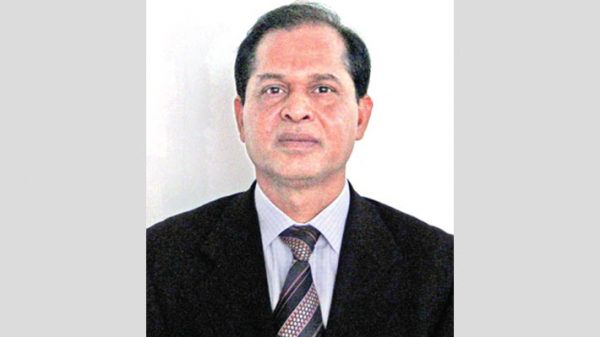‘Recover Better – Stand up for Human Rights’

- Update Time : Thursday, December 10, 2020
- 133 Time View

Countries all over the world celebrate Human Rights Day every year on 10 December. Not only the government, but social and cultural organisations also celebrate the day through their own programmes. The day is normally celebrated by organising conferences, meetings, cultural events, exhibitions, etc to highlight human rights issues aiming to make the people aware of their rights. Some protest activities are also held in order to create awareness among the people where human rights are not recognised or respected. Bangladesh, like other countries, also commemorates the day with day-long programmes.
We know that the objectives of celebrating Human Rights Day are mainly to (a) create and promote awareness among the people about their rights as a human, (b) brief the people about the endeavours of the United Nations in order to improve the overall human rights conditions in different parts of the globe, (c) discuss and exchange views on the importance of human rights on specific issues, and (d) encourage the vulnerable and marginalised groups of the society to take part in those events and enrich their knowledge about their rights. However, this year, the day might not be celebrated with elaborated programmes due to the Covid-19 pandemic across the world.
The issue of human rights was always crucial from the very beginning of human civilisation. Once, people even did not understand what human rights are. They did not have any idea that they had some rights as a member of human society. It was only the muscle power that existed to rule the people. It is not so long when people used to be bought and sold. The poor and have-nots were treated inhumanly by the rich or powerful people or nation. However, with the development of the education system, cultural advancement and political awareness that situation started changing. But, till now, as it was expected, violation or denial of human rights could not be stopped. Such cases are found not only in the developing or under-developed countries but in the developed nations also.
We know that the Universal Declaration of Human Rights, adopted and proclaimed by the United Nations General Assembly on 10 December 1948, was one of the first major achievements of the newly established United Nations. The question of observing Human Rights Day came two years later in 1950, when the UN General Assembly at its 317th Plenary meeting declared 10 December as the Human Rights Day. Since then, the day is celebrated every year all over the world.
The Declaration says, “All human beings are born free and equal in dignity and rights. They are endowed with reasons and conscience and should act towards one another in a spirit of brotherhood.” Everyone is entitled to all the rights and freedom set forth in this Declaration, without distinction of any kind, such as race, colour, sex, language, religion, political or other opinions, national or social origin, property, birth or other status. It further says that everyone has the right to life, liberty and security of person. In fact, its 30 articles explain everything of a person’s human rights, whether those rights concern his political, economic, judicial, social, cultural, livelihood or even personal protection. It is to be noted that though the Declaration, with its broad range of rights, is not a binding document, but it inspires more than 60 human rights instruments which together constitute an international standard of human rights. However, I am not going to elaborate them.
Bangladesh established a National Human Rights Commission in 2007, which was re-established in 2009 by the National Human Rights Commission Act, 2009 as a national advocacy institution for promotion and protection of human rights. It has been very active, within its limited resources, in safeguarding people’s human rights, though there are fields in which it should give more thrust to earn people’s confidence. While celebrating Human Rights Day in Bangladesh, we feel that the National Human Rights Commission should be strengthened enough so that it can deliver its mandate to protect civil and political rights of all people including the backward section of our population, stop extra-judicial killings and enforced disappearances, advise law enforcement agencies particularly our police to update their knowledge on human rights issues, conduct anti-narcotics drives, enhance capacity of the civil societies and community-based organisations to engage in human rights advocacy and awareness-raising activities, etc. The Commission should not forget to monitor the situation if there is any violation of the rights of freedom of expression of opinion and freedom of association and intervene, if necessary, to improve the situation. Our Human Rights Commission might also consider organising seminars or discussions for the students, even at the school level, which would help them understand their rights as well as responsibilities. A deeper understanding of the concept of human rights is as much about respecting others’ rights as knowing their own.
The theme of this year’s Human Rights Day is ‘Recover Better – Stand up for Human Rights’. We know that Covid-19 has already been fuelled by deepening poverty, rising inequalities, structural and entrenched discrimination and other gaps in human rights protection. Recognising the fact, the theme has been chosen relating to the Covid-19 pandemic and focusing on the need to build a better world by ensuring Human Rights.
In a world with corona pandemic, we need a strong unity to fight against it to ensure the smooth continuity of our socio-economic activities and the development of our nations. Our solidarity can guarantee our people to have a healthy environment for proper health care, access to education, economic opportunities and a decent standard of living. For that, we have to create equal opportunities for all, address the failures exposed and exploited by Covid-19, and apply human rights standards to tackle entrenched, systematic, and intergenerational inequalities, exclusion and discrimination. Only appropriate measures can advance human rights and ensure full recovery and build back a world that would be better, more resilient and sustainable.
On 4 November, while virtually joining a discussion meeting on ‘Bangabandhu’s political ideology and 1972’s Constitution’, Speaker Dr. Shirin Sharmin Chaudhury said, “Benefits of the Constitution should be conveyed to the distressed people for their well-being.” We believe that the concerned authorities of Bangladesh would take note of it and ensure the people enjoying the benefits of our Constitution formulated by our Father of the Nation Bangabandhu Sheikh Mujibur Rahman for his people’s rights as human beings. There is no doubt that the implementation of our Constitution would ensure the protection and promotion of human rights of all our people.
On this auspicious day, we, the people of Bangladesh, along with the world community, hope that from today, there would not be any more violation of human rights in any corner of the world and all people would be treated as having the same worth and dignity without regard to such differences as ethnic origin, colour of skin, sex or beliefs. At the same time, we have to play our respective role in building a post-Covid world for our present as well as future generation where human rights would be well protected.
The writer is a former Ambassador and Secretary



















